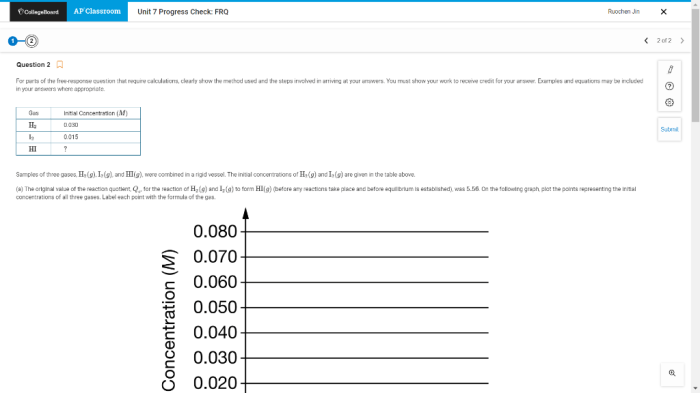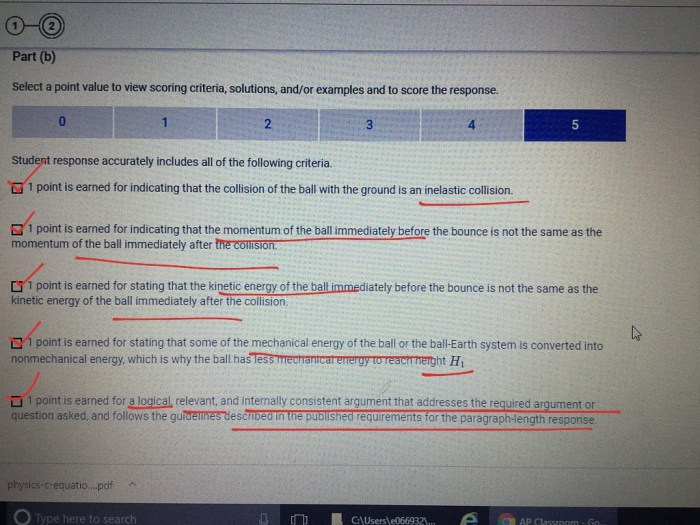Embarking on a journey through Unit 5 Progress Check FRQ, this comprehensive guide will illuminate the intricacies of this crucial assessment, empowering you with the knowledge and strategies to conquer it with confidence.
Delving into its historical context, structure, content, and evaluation criteria, we’ll unravel the secrets of the FRQ, equipping you with the tools to excel and achieve your academic aspirations.
Historical Context of Unit 5 Progress Check FRQ

The Unit 5 Progress Check FRQ has evolved significantly since its inception, reflecting changes in educational goals, assessment practices, and the content of the unit itself.
Initially, the FRQ was designed to assess students’ understanding of basic concepts and skills covered in the unit. It consisted of a few short-answer questions that required students to recall facts and apply simple procedures.
Evolution of the FRQ
Over time, the FRQ has become more complex and challenging. It now includes a variety of question types, such as multiple-choice, short-answer, and essay questions. The questions require students to demonstrate a deeper understanding of the unit’s content, including its historical context, key concepts, and applications.
In addition, the FRQ has been revised to align with the latest educational standards. For example, the current FRQ places a greater emphasis on critical thinking and problem-solving skills.
Purpose and Goals of the FRQ
The FRQ serves several important purposes. It helps teachers to:
- Assess students’ understanding of the unit’s content
- Identify areas where students need additional support
- Provide feedback to students on their progress
- Prepare students for future assessments, such as standardized tests
Overall, the Unit 5 Progress Check FRQ is a valuable tool that can help teachers to assess students’ learning and provide them with the support they need to succeed.
Structure and Format of Unit 5 Progress Check FRQ

The Unit 5 Progress Check FRQ typically consists of three sections, each with a specific set of questions and format.
Multiple-Choice Questions
The first section comprises multiple-choice questions that assess students’ understanding of key concepts and factual information. These questions are designed to be answered quickly and accurately, testing students’ ability to recall and recognize essential details.
While the Unit 5 Progress Check FRQ can be daunting, don’t fret! Dive into the world of Operating Room RN A V2 for insights and strategies to tackle those pesky questions. Then, come back to the Unit 5 Progress Check FRQ with newfound confidence and conquer it like a pro!
Short-Answer Questions
The second section features short-answer questions that require students to provide brief, specific responses. These questions often ask students to explain concepts, provide examples, or analyze information. They test students’ ability to comprehend and articulate their understanding of the material.
Essay Question
The final section of the FRQ consists of an essay question that requires students to demonstrate their ability to synthesize and organize information. This question typically asks students to analyze a topic, support their arguments with evidence, and draw logical conclusions.
The essay question assesses students’ critical thinking, writing, and research skills.
Students are given a specific amount of time to complete the FRQ, and they are expected to manage their time effectively to ensure they can answer all the questions to the best of their ability.
Content and Scope of Unit 5 Progress Check FRQ
The Unit 5 Progress Check FRQ assesses students’ understanding of the key concepts and skills covered in the unit. It aligns with the unit’s learning objectives and curriculum, focusing on the following:
Key Concepts and Skills
- Understanding the historical context of the unit’s topic.
- Analyzing primary and secondary sources.
- Developing a historical argument.
- Writing a clear and concise essay.
Topics and Themes
Past FRQs have addressed a variety of topics and themes, including:
- The causes and consequences of the American Revolution.
- The impact of the Industrial Revolution on American society.
- The role of slavery in the development of the United States.
- The challenges and successes of the American Civil War.
- The rise of the United States as a global power.
Strategies for Success on Unit 5 Progress Check FRQ

Approaching the Unit 5 Progress Check FRQ with confidence requires a well-rounded preparation strategy that encompasses effective study methods, time management techniques, and a tailored approach to different question types.
Effective Study Methods
- Active Reading:Engage with the course material by actively reading and highlighting key concepts. Summarize and rewrite notes in your own words to reinforce understanding.
- Spaced Repetition:Review material at increasing intervals to enhance retention. Use flashcards, practice questions, or online spaced repetition tools.
- Peer Study Groups:Collaborate with classmates to discuss concepts, quiz each other, and share insights. Different perspectives can broaden your understanding.
Time Management Techniques
During the exam, it’s crucial to allocate time wisely. Consider the following strategies:
- Preview the FRQ:Before starting, take a few minutes to scan the questions and identify the ones you’re most confident in.
- Time Allocation:Divide the allotted time among the questions based on their difficulty and point value. Stick to the time limits to avoid spending too much time on any one question.
- Breaks:If time permits, take short breaks to clear your mind and refocus.
Answer Organization Tips
Clarity and organization are essential for FRQ responses. Implement these tips:
- Structured Responses:Organize your answers using clear paragraphs, topic sentences, and supporting evidence.
- Thesis Statements:For essay questions, start with a strong thesis statement that Artikels your main argument.
- Citing Evidence:Support your claims with specific examples, data, or quotations from the course material.
Approaching Different Question Types
The FRQ may include a mix of question types. Here are some strategies for each:
- Multiple-Choice Questions:Read the question carefully and eliminate incorrect answers. Consider the context and any supporting information provided.
- Short Answer Questions:Provide concise, specific answers that directly address the question. Use clear and concise language.
- Essay Questions:Follow the tips for answer organization and thesis statements. Develop a well-supported argument that demonstrates your understanding of the topic.
Evaluation and Grading of Unit 5 Progress Check FRQ

Student responses to the FRQ are evaluated based on several key criteria. Clarity, accuracy, and organization are essential for earning high scores. Let’s delve into each criterion and its significance.
Clarity, Unit 5 progress check frq
Clarity refers to the ease with which the reader can understand the student’s response. Students should present their ideas in a logical and coherent manner, using precise language and avoiding ambiguous or vague statements. Responses should be well-structured, with clear transitions between ideas.
Accuracy
Accuracy refers to the correctness of the student’s response. Students must demonstrate a thorough understanding of the concepts being tested and provide factually correct information. Incorrect or incomplete information will result in lower scores.
Organization
Organization refers to the way in which the student presents their response. Responses should be well-organized, with a clear introduction, body paragraphs, and conclusion. Each body paragraph should focus on a specific topic or idea, and there should be a logical flow between paragraphs.
Proper formatting and citation of sources, if applicable, are also important aspects of organization.
Model Responses
Here are examples of model responses that demonstrate exemplary performance on the FRQ:
- Clarity:The response is written in clear and concise language, with precise and specific examples. The student effectively communicates their ideas and ensures that the reader can easily follow their train of thought.
- Accuracy:The response demonstrates a deep understanding of the concepts being tested. The student provides accurate and relevant information, supported by evidence from the text or other sources.
- Organization:The response is well-organized, with a clear introduction, body paragraphs, and conclusion. Each body paragraph focuses on a specific topic or idea, and there is a logical flow between paragraphs. The student uses proper formatting and citations, making their response easy to read and understand.
General Inquiries
What is the purpose of the Unit 5 Progress Check FRQ?
The FRQ serves as an assessment tool, evaluating your understanding of key concepts and skills covered in Unit 5.
How can I prepare effectively for the FRQ?
Engage in thorough content review, practice answering different question types, and familiarize yourself with the evaluation criteria.
What are some common mistakes to avoid on the FRQ?
Rushing through questions, providing incomplete or unclear responses, and failing to organize your answers effectively are common pitfalls.